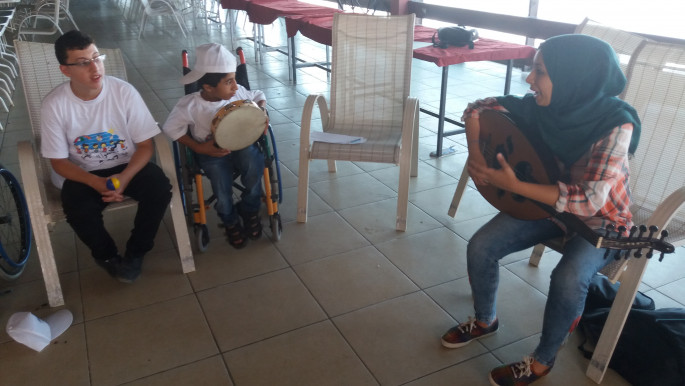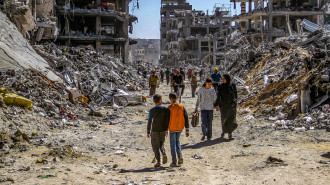Gaza's first music therapist is transforming the lives of war-traumatised children
The Alshalihat beachfront resort was playing host to a summer camp, organised by Handicap International, for Gaza's children - particularly those with special needs.
"Over the past two years, I have held several training sessions for people with special needs, adult girls and children, using certain techniques of my own," said Reem, a 26-year-old music therapist.
"Many of those sessions were therapy with the help of music, dedicated for those exposed to some bad life experiences," she told The New Arab, as the children played on.
Reem has been playing music since she was 12 years old. A graduate in business administration, she travelled to Belgium in 2014 - where she began taking part in children's musical therapy.
"When I participated in those sessions abroad, I employed my talent in performing in front of international audiences. I remember well that when I moved from a place to another, people who knew about me encouraged me to do more. Some advised me to pursue music therapy studies abroad."
 |
|
| Reem Anbar leads her class through a therapy session [Rami Almeghari] |
Her skills matched a need after the Israeli war on Gaza in June 2014. She had begun applying some of her therapeutic techniques upon herself and found in music a great relief.
"The idea of musical therapy came back to my mind while I was relaxing and holding my lute. I played some tones while I was not really thinking and I realised that those sounds had relieved me a lot. Music is the nutrition of one's soul."
Initial success
Reem was able to start her first musical therapy sessions for a number of women, including young girls, in the central Gaza Strip.
"I happened to meet a 15-year-old girl, who belonged to a highly-conservative Bedouin tribe," said Reem. "The girl told me that she was exposed to harassment by a neighbour when she was a child. This girl was able to speak up with the help of music, and some special dancing techniques that I managed to teach participants. In the course of a few hours, the girl began to move, dancing, and speaking about her trauma."
 |
Some of the techniques I use include asking participants to relax and listen attentively to my music, asking them to start massaging their heads slowly, stirring their own thoughts |  |
Reem found further success when she was invited to hold a musical session for a group of men with developmental disabilities.
"One of the participants in those special musical sessions, did not want to express himself and said to me: 'I am unable to move or participate'. I responded to him by saying 'do not forget that you may have a nice sweet voice'. By then, the man felt confident and began participating as a singer during the musical sessions."
Special techniques
Reem's sessions take on different styles of therapy, some of which she has invented herself, and others she has collected from other therapists.
"Some of the techniques I use include asking participants to relax and listen attentively to my music, asking them to start massaging their heads slowly, stirring their own thoughts by allowing them to speak about their own dreams, wishes and experiences.
"At the practical level, first I teach my trainees the various musical levels and rhymes and once I am sure they have learned, I begin asking them to play accordingly.
"This technique has worked with this group of children, for example. Hammad here is a 14-year-old boy in a wheelchair. He now plays the drums very well, and is one of the best participants."
Ambitious
Reem, considered the first full-time music therapist working in Gaza, is busy with therapy programs and training courses - some she runs herself, others run by non-governmental organisations - across the densely packed coastal territory under siege by Israel.
The young Gazan musician hopes she will one day be able to pursue higher musical studies, particularly in music therapy, outside of the Gaza Strip.
"When I visited Belguim back in 2014, some organisers of my trip advised me to pursue such an education, saying that I could do a lot more, given the fact that therapy by means of music is something that can be rarely found, in our world."
Rami alMeghari is a Palestinian freelance journalist living and working in Gaza. Follow him on Twitter: @writeralmeghari





 Follow the Middle East's top stories in English at The New Arab on Google News
Follow the Middle East's top stories in English at The New Arab on Google News


